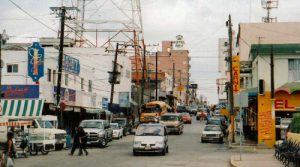Dispatch From Mexico—Reynosa, a City Under Siege
New America Media

REYNOSA, Tamaulipas, Mexico—It takes 30 minutes to reach Reynosa, Mexico, from McAllen, Texas. But it only takes 30 seconds to realize that it’s a town under siege.
It’s a regular business day but most of the businesses are closed or empty. “For Sale” signs are everywhere. Most buildings—many showing architectural details in vogue during the town’s heyday, just after World War II—stand unpainted, windows broken, some shops burned out. Many look like they were burned recently.
“Open since 1936,’’ reads a big sign on the wall of one of the city’s most famous restaurant of decades ago. The restaurant is closed. Even small taquerias are closed, the dust on their tables and kitchen equipment visible through stained windows.
Even on a bright day, there is a strange density to the place—as though the town is governed by secrets. Most people turn away from the visitor who is asking too many questions. The few who talk warn the visitor that long stretches of highway, outside of town, are “extremely dangerous.” The roads, in any case, are of no use after dark.
People say that the town’s hotels and motels are “under surveillance” by the Gulf Cartel. The Gulf Cartel controls who comes and who goes.
Despite the fact that it is midday in a city whose population approaches 1 million, only a handful of people are in plain view. An old man and woman sell trinkets, homemade candy and everything that is essential to nobody. In any case, nobody seems to be buying. Cars and trucks pass swiftly through the narrow hilly streets with an urgency that suggests that business is being done elsewhere.
“It is so screwed up that not even prostitutes bother to walk down here,’’ says Ramon Dominguez, a man in his 50s who has lived in Reynosa all his life.
Dominguez grows nostalgic talking about the good old days, especially the weekends, before life changed drastically here. “The kids from McAllen used to come to get drunk and take advantage of the willingness of the waiters who used to serve them till they dropped fully drunk.’’ He remembers how he would drive the American kids back home, since he was one of the few taxi drivers who had a green card and could travel across the border in both directions.
“I really thought I was lucky,’’ he adds.
But not so much anymore.
In those “good old days,” there was drug trafficking just as there is now, and everybody knew about it and made no fuss, Dominguez says. Yes, there were drug addicts, but in reality most of the drugs flowed freely to the north and no dead bodies were seen hanging from bridges.
A man overhears this conversation and interrupts: “I don’t know who the fuck you are, but I am going to answer your questions. Just don’t ask too many because you never know… who is listening.’’ This stranger agrees only to say that his name is Alberto.
Just like Dominguez, Alberto remembers “the good old days.”
He talks about a “gringa” who, years ago, fell in love with him and wanted to marry him.
“But, I was too proud. Now sometimes I wonder how my life would have turned if I would had just said yes to the American.”
Alberto says with nostalgia in his voice: “Things were still good in Reynosa until this bastard [the Mexican president, Felipe Calderon] decided that he was going to be Superman and fight the narcos.’’
“We are all paying for his stupidity… the whole country is paying. Even people who are not from this country are paying, just ask the families of the dozens of immigrants that were killed in San Andres! They had nothing to do with [Calderon’s] war and they lost their lives.”
Then Alberto walks away.
It is best for the visitor not to seem to follow him, best not to carry a pen and notepad, best not to ask too many strangers many questions.
Everyone needs money. But when the visitor asks a few men if any of them can drive him to San Fernando, the town where 72 migrants were recently massacred, the men look at the visitor as though he is crazy. They decline.
In the state of Tamaulipas, everybody minds their own business. But those few who talk make clear that they see themselves as victims or they know people who have been victims in the drug war.
The editor of a local publication who agrees to talk only under the condition of anonymity says, “Our publication doesn’t cover the drug cartels, for the very simple reason that we have no way to insure the safety of our reporters or our employees. We don’t see the point of being martyrs. Everybody in town knows who the criminals are, everybody, including local authorities, knows where they are selling the drugs. But no one does anything about it.”
“We are all under the rule of silver or lead,’’ he adds, referring to a very old Mexican saying: If you refuse the money (silver) to keep things quiet, you will certainly receive a lead bullet in your head and end up quiet forever.
The visitor is advised by several people to get back on the U.S. side before dark.






